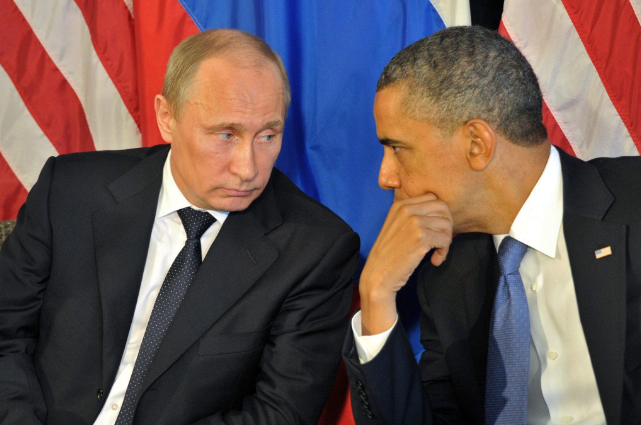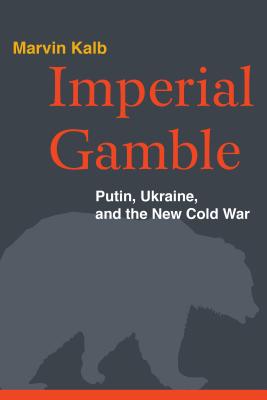
Book review: Imperial Gamble: Putin, Ukraine, and the New Cold War. By Marvin Kalb. Brookings Institution Press, 2015. 230 pages, $20,20 (Hardcover, amazon.com)
Published in: Central European Journal of International and Security Studies (CEJISS). Edition 1-2017. ISSN:1802-548x
——————
[…] without Ukraine, Russia ceases to be an empire, but with Ukraine suborned and then subordinated, Russia automatically becomes an empire.
Zbigniew Brzezinski
You don’t understand, George, that Ukraine is not even a state.
Vladimir Putin to George W. Bush
——————
In 2004, at a public debate about the Future of the European Union at Harvard’s Kennedy School, optimism was in the air. The EU had just completed the largest expansion in its history earlier in the year, adding Poland, the Baltics, the Czech Republic and Hungary, among others, to the club. Discussions about Turkey’s accession were gathering steam. “At some point”, a scholar said, “we’ll have to talk about an expansion far bigger. One day we’ll have to talk about inviting Russia to join the EU.”
No policy maker at the time seriously thought about integrating Russia into the European Union, of course. But the mere fact that such an idea was stated publicly (even though explicitly framed as a long-term goal) showed how confident many observers were not only about the European project, but about integrating Russia in Western structures. In 2012, Republican presidential candidate Mitt Romney was largely ridiculed for suggesting that the major threat posed to the United States was Russia.
Even in 2014, when the West’s ties to Russia were no longer what they used to be after the end of the Cold War, the vast majority of policy makers and international affairs scholars still believed that things like territorial conquest were a thing of the past. To them, the 2014 annexation of Crimea by Russian forces was a stunning event which put many of the previously held beliefs in doubt. Putin, they argued, was on the wrong side of history, and ideally he should pull out of Ukraine to allow the country to decide its own fate.
As Marvin Kalb argues in Imperial Gamble: Putin, Ukraine, and the New Cold War, this is wishful thinking:
Putin will not return Crimea to Ukraine, because Russians believe it never really belonged to Ukraine. They feel it always has been theirs. Nor will Putin abandon the rebels in southeastern Ukraine, because they have become his wards and because their realm gives him undeniable leverage over the future of all Ukraine. If there is a Putin doctrine, hidden somewhere in his rhetoric, it would be that people who consider themselves Russian, no matter where they live, cannot and will not be abandoned by Moscow. (p.xviii)
As Putin had argued before about Ukraine,
We are not simply close neighbors, but, as I have said many times already, we are one people. Kiev is the mother of Russian cities. Ancient Rus is our common source, and we cannot live without each other.
Imperial Gamble provides sound historical background to explain such statements, which still often generate confusion among Western policy makers. Kiev is not only seen as the origin of Russian civilization and nationhood, but also was its center (and Russia’s first capital) for a long time. Ukraine’s importance for Russian politics continued all the way until the collapse of the Soviet Union: Khrushchev was brought up in Ukraine and was married to a Ukrainian woman. When, as a young man, Brezhnev applied for membership in the Communist Party and was asked his nationality, he answered: “Ukrainian.”
In a particularly engaging section of the book, Kalb shows how the Mongol occupation of Rus had a profound impact on Russian culture, stalling development at a time when the rest of Europe began to emerge from the Middle Ages. It also led to the emergence of an alternative hub, Moscow, and the first tsar, a product of complex negotiations with the Mongol khan. It was only in 1480 that Ivan III severed all ties with the Mongol Empire.
The chapter on Catherine the Great makes clear how intimately the Crimean peninsula is tied to Russian history:
“Now, just imagine that the Crimea is yours,” [Gregory Potemkin, the region’s administrator] wrote [to Catherine], stroking her vanity. “Believe me, you will acquire immortal fame such as no other sovereign of Russia ever had. This glory will open the way to still further and greater glory.” […] in July 1783, setting the stage for what Putin did a few centuries later, Catherine followed Potemkin’s advice, making the strategic peninsula of Crimea an integral part of Imperial Russia. (p.55)
The book excels at explaining the ambiguity of Ukraine’s status over the centuries, and how the emergence of Ukrainian nationalism generated profound anxiety among policy making elites in Moscow. At the end of the 19th century, Russia decided to ban all books in Ukrainian, which led literacy rates to plummet. In 1897, barely 13 percent of people living in Ukraine could read and write. In addition to uncertainty about whether Ukraine should be an independent nation or not, another constant division emerged: one part of the country tilted towards the West, the other, in the east, towards Russia.
During Stalin’s early years in power, the Donbas region and the Dnieper Valley were transformed into industrial hubs, suggesting that Moscow did not consider Ukrainian independence a serious possibility. That changed when World War II began, when over a million Ukrainians were deported from western Ukraine to Siberia, the Arctic Circle, and Soviet central Asia to reduce groups critical of Moscow. Paradoxically, it was in the name of Ukraine, and not of Russia, that Stalin successfully claimed vast territories west of then pre-1939 frontier, thus extending the USSR into central Europe and the Danubian valley. Indeed, Ukrainian independence in 1991 would have been impossible without 1939–1945, when Stalin inadvertently helped spark a sense of Ukrainian nationhood by creating a unified land, though under Soviet control, called Ukraine — and moving a step further by insisting that Ukraine have a vote at the UN after 1945 to always support Russia.

Still, Khrushchev’s decision to hand Crimea to Ukraine a decade later — a mere administrative technicality at the time — showed that policy makers in Moscow did not believe Ukraine would ever be separated from the Soviet Union. When describing the end of the Cold War, Kalb shows how central Ukraine’s referendum to leave the Soviet Union was key to explain its demise. He also shows that, upon becoming an independent country, Ukraine’s relationship to Russia remained one of unresolved issues — after all, as he puts it, ” Ukraine means ‘borderland,’ the Ukrainian looking from the border of Russia, through a hazy window, into Russia’s heart and soul.”
Above all, Imperial Gamble is a book on Ukraine’s political history, even though in several instances the author veers off and describes events in Moscow at length. To some extent, this reflects the role Russia continues to play in Ukrainian politics.
Kalb is very critical of Yushchenko, who emerged after the Orange Revolution, and laments that Ukraine could have addressed its most complex challenges such as corruption and economic mismanagement. The years between 2005 and 2010, he suggests, were full of missed opportunities:
From the glory days of the Orange Revolution in 2004 to the dark winter of 2010, Yushchenko had shrunk into political ignominy, a politician of promise who had failed to deliver on a single reform. Many Ukrainians believed that if Yushchenko could not deliver, no one could. Their disillusionment with government deepened into a hard cynicism. (p.138)
The protests of 2014 that ultimately led to Yanukovych’s ouster are described in detail, as this is the central dilemma that would lead to the greatest crisis of East-West relations since the end of the Cold War: were the protesters freedom fighters who ousted an illegitimate government, or did they illegally overthrow an elected government? Putin’s argument that intervention was necessary to protect Russians living in Ukraine from aggression was a pretext, Kalb writes.
In the West Putin was demonized, but in Russia his poll numbers jumped to new highs. He had accurately read the mind of the Russian people. They needed a psychological boost, and Putin provided one.
The book’s title suggests that Russia’s annexation of Ukraine is the beginning of a “new Cold War”. At first glance, that seems to make sense: After all, ties have not been this tense since the late 1980s. And yet, there is something misguided about this comparison. The Cold War was not only about geographically restricted tensions between Russia and the West. Rather, it was a globe-spanning ideological contest which shaped the lives of millions of citizens, not only in Europe and Russia, but in Africa, Latin America and Asia, for example through proxy wars or foreign meddling in domestic politics.
Tensions with Russia are arguably important, but they do not define global dynamics. US policy makers are far more concerned about the rise of China or chaos in the Middle East than how to deal with Russia. Even for European countries like Germany, Russia is important, but not eclipsing other issues such as China. In addition, contrary to the Cold War, Russia promotes no specific ideology. While authoritarian politics may be popular in many countries around the world, it would be a stretch to say that this can be traced back to Vladimir Putin.
Still, Imperial Gamble is a carefully researched and easily accessible analysis of Ukrainian history, and highly recommended for all those who seek to gain a deeper understanding of the geopolitical crisis that emerged in the aftermath of the 2014 Maidan protests and Russia’s annexation of Crimea. Two years after the first clashes, there seems to be no solution in sight. Worse, many fear Putin could seek to destabilize other countries with a sizeable Russian minority, such as Estonia, where 26 percent are ethnic Russians. That makes Donald Trump’s comments about the Baltics, leaving it open if he’d invoke Article 5 if they were attacked by Russia, all the more relevant.
Read also:
BRICS and SCO: Russia’s Big Summit
Victory Day Parade points to BRICS grouping’s growing importance for Russia
Photo credit: RiaNovosti / EPA









